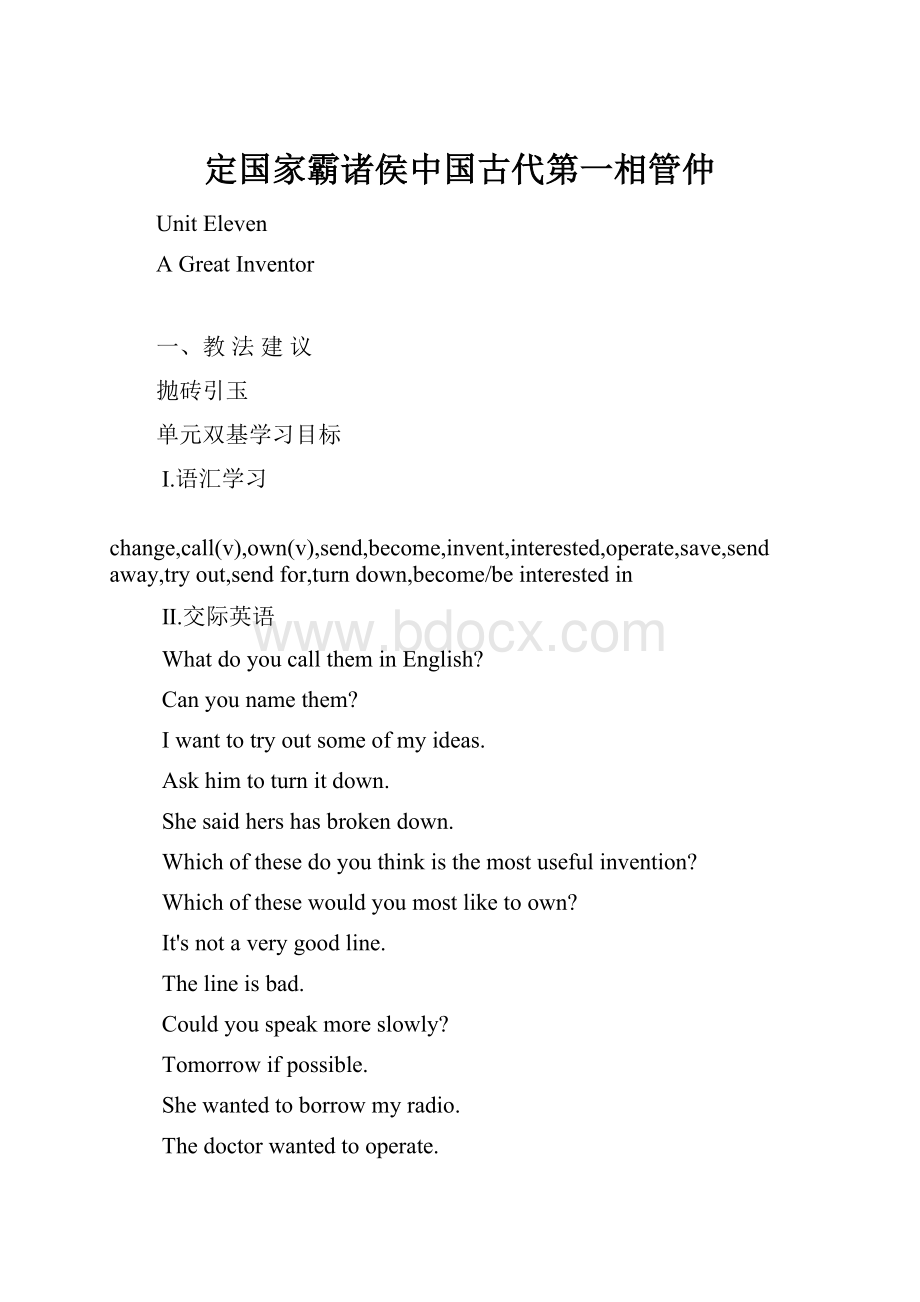定国家霸诸侯中国古代第一相管仲.docx
《定国家霸诸侯中国古代第一相管仲.docx》由会员分享,可在线阅读,更多相关《定国家霸诸侯中国古代第一相管仲.docx(34页珍藏版)》请在冰豆网上搜索。

定国家霸诸侯中国古代第一相管仲
UnitEleven
AGreatInventor
一、教法建议
抛砖引玉
单元双基学习目标
Ⅰ.语汇学习
change,call(v),own(v),send,become,invent,interested,operate,save,sendaway,tryout,sendfor,turndown,become/beinterestedin
Ⅱ.交际英语
WhatdoyoucalltheminEnglish?
Canyounamethem?
Iwanttotryoutsomeofmyideas.
Askhimtoturnitdown.
Shesaidhershasbrokendown.
Whichofthesedoyouthinkisthemostusefulinvention?
Whichofthesewouldyoumostliketoown?
It'snotaverygoodline.
Thelineisbad.
Couldyouspeakmoreslowly?
Tomorrowifpossible.
Shewantedtoborrowmyradio.
Thedoctorwantedtooperate.
Tellhertoturnitdown.
Askthemtospeakmoreloudly.
RetellLesson42insimplesentences.
Ⅲ.语法学习
动词不定式用作宾语和宾语补足语
常见的以不定式做宾语的动词有:
want,like,wish,hope,try,ask,start,begin,forget
remember,learn,choose,agree,tell等。
如:
Wemusttrytodowellineverysubject.
Iforgettobringmykey.
IliketowatchTV.
Thedoctorwantedtooperate.
Shewantedtoborrowmyradion
不定式在句中可做宾语的补足语,以表示宾语的动作或情况。
能以不定式作宾语补足语
的谓语动词常见的有ask,tell,invite,get,want,help,wish,like,wouldlike等。
如:
Wouldyoulikeustogowithyou?
I'llgetsomeonetomendmybike.
Tellhertoturnitdown.
Askhimtocomequickly.
Shetaughthimtoreadandwrite.
在make,let,see,hear,watch,feel等动词后做宾补的动词不定式不带to。
如:
Ioftenseethemtakeawalktogether.(我经常看到他们在一块散步。
)
Letmetry.(让我试试。
)
指点迷津
单元重点词汇点拨
1.invent发明;创造
ThomasEdisoninventedtheelectriclamp.
【点拨】invent是指发明前所未有的东西,discover是指发现以前人们未注意到的东西。
invent的名词形式是invention(发明),inventor(发明家)。
Edisonwasagreatinventor.
2.change改换;更换;改变;变化
Hechangedhisclothes.
Theweatherchangedsuddenly.
Greatchangeshavetakenplaceinthatvillage.
Therewaslittlechangeinhim.
【点拨】change+sth.+for+sth.意为“将某物更换成某物”。
change+from+sth.+to+sth.意为“由……换乘……”。
如:
Ichangedfromthesubwaytoabus.
change作名词讲时,还有“零钱”之意,如:
payinsmallchange(以零钱付款)。
3.call把……叫做;称呼
WhatdoyoucallthisinEnglish?
SheiscalledMary.
【点拨】callsb.sth.是“把某人叫做……”之意。
4.fridge电冰箱
Heboughtafridgeyesterday.
【点拨】fridge是英语口语的说法,美国口语亦称icebox,书面语为refrigerator。
5.own所有;拥有
Johnownsacar.
【点拨】own常指通过合法手段取得而长期占有。
另own为状态性动词,一般不用进行时态。
ofone'sown意为“属于某人自己的”。
如:
Thishouseishers.=Thishouseisofherown.=Thishousebelongstoher.
6.send派,派遣,派人(去请,去拿);寄发;送
Iwillsendmysontoyouwithmymessage.
Heisill,wemustsentforthedoctoratonce.
I'llsendyouabirthdaypresent.
【点拨】send的过去式、过去分词为sent。
sendfor意为“派人去叫”,sendout
是“发出”之意。
7.strange奇怪的;古怪的;陌生的
Iamstrangetothispartofthetown.
Strangetosay,hewascalm.
Thisplaceisstrangetome.
【点拨】strange的反义词为familiar,它无比较等级。
bestrangeto意为“对…
…生疏”,strangetosay意为“说也奇怪”。
8.become变得;成为
Itbecamedarkeranddarker.
Hehasbecomeafamousman.
【点拨】become的过去式、过去分词为became,become。
后常接名词、形容词作表语。
又如:
Theyoungmanbecameangrywiththeguard.
9.interested感兴趣的;关心的
Theyareveryinterestedtohearaboutthegoodnews.
Hebecomesinterestedinsports.
【点拨】beinterestedin…意为“对……感兴趣”。
10.mirror镜子
Marylookedatherselfinthemirror.
【点拨】lookinthemirror是“照镜子”之意。
11.light
(1)光,光亮,光线(不可数名词)
Thereisenoughlightinthisroom.
(2)灯,灯光,发光体(物)(可数名词)
Don'tforgettoturnoffthelights.
【点拨】light还可作形容词,意“明亮的,轻的”。
lighted常用作形容词,置于名词之前,如alightedstick=abutningstick(点着的棍)。
12.operate动手术;运转(不及物动词);操作,开动(及物动词)
Itisnotdifficulttooperatealift.
Thedoctorwilloperateonherlegtomorrow.
Themachineisnotoperatingproperly.
【点拨】operateonsb.意为“给某人动手术”。
13.clear清楚的;清晰的;晴朗的;明白的
Maryhasaveryclearhead.
Iamnotclearaboutthat.
【点拨】作形容词时,clear指清澈透明。
clean指没有尘埃、脏东西。
clearly是clear的副词形式。
14.save救;挽救
Hesavedthechildfromtheriver.
Theysavedtheoldmanfromthefire.
【点拨】saveone'sface意为“保全某人面子”。
saveone'slife意为“救某人的命”。
15.line(电话的)线路;电线;线,绳
Holdtheline,please.
Hedrewalinewithhispencilandruler.
【点拨】belinedwith意“排列着”。
Theroadislinedwithtrees.
单元词组思维运用
1.liftup抬起,提起,举起
Theboyliftedtheboxofsweetsupandrushedoutoftheroom.
2.bebadfor对……有害
Theysaythatsmokingisbadforthehealth.
Don'treadinthesun.It'sbadforyoureyes.
Toomanysweetsarebadforyourteeth.
【说明】反义词组是:
begoodfor(对……有利)。
3.sendaway撵走,开除;解雇
Whydidtheboy'steachersendhimawayfromschool?
Thebadyoungmanwassentawayfromhisfactory.
4.tryout试验;尝试
Beforyyoubuyanymachine,it'sbesttotryitoutfirst.
Whenhewasachild,hewasalwaystryingoutnewideas.
【说明】tryon意为“试穿”。
Shetriedthedressonbeforeamirror.
5.takesb.(sth.)outof把某人(某物)从某处带走(拿出)
Letmetakeyououtofthepark.
Shewastakingthethingsoutofthebasket,whenshedroppedabagofsweets.(她当时正把东西从篮子里拿出来,这时候她掉了一袋糖果。
)
6.become(be)interestedin对……变得有兴趣
Evenbeforehewasten,hebecameveryinterestedinscience.
HeisinterestedinthestudyofEnglish.
7.attheageof在……岁时
HebegantolearnEnglishattheageofseven.
Atwhatagedochildrenstartschoolinyourcountry?
8.sendfor派人去请(叫)
MothersentTomforthedoctor,butheisn'tbackyet.
Thenextdaytheysentforthelostcat.
9.turndown(收音机、灯等)关小,调低
Couldyouturnyourradiodown,please?
PleaseturndowntheTV.It'stooloud.
10.breakdown坏了,损坏;坍塌
Thebusbrokedownonthewaytoschool.
11.haveanidea想出一个办法
Useyourhead,andyou'llhaveanidea.
Ihaveagoodidea.
12.What…of?
为什么…?
Whatdoyoucomeherefor?
你来此干什么?
二、学海导航
学法指要
单元难点疑点思路明晰
1.Onedaywhenhewasfiveyearsold,hisfathersawhimsittingonsomeeggs.他五岁时一天,爱迪生的父亲看见他坐在一些鸡蛋上。
(1)whenhewasfiveyearsold是宾语从句,修饰前面的名词oneday,表示“当他
五岁时的一天”。
oneday通常表示过去的某一天,someday通常表示将来的某一天。
(2)sittingonsomeeggs是一个现在分词短语,作宾语him的补足语。
有些动词,
如:
see,hear,feel,find,watch,keep等常接“名词/代词+现在分词”,组成复合宾语,说
明宾语正在干什么事。
又如:
Isawhimworkinginthegardenyesterday.
DidyouhearhimreadingEnglishinthegarden?
现在分词作宾语补足语和不带to的不定式作宾语补足语的区别是:
现在分词表示动作
正在进行,而不带to的不定式则表示动作已经完成。
如:
Isawhimputtinghishandintohispocket.(动作正在进行)
Isawhimputhishandintohispocket.(动作已经完成)
上面这些句子里的动词都是表示感觉的动词,在它们后面作宾语补足语的,可以是现在
分词,也可以是不带to的不定式。
2.Whichofthesedoyouthinkisthemostusefulinvention?
这些发明中你认为哪一种发明的东西最有用?
本句的疑问句是:
Whichoftheseisthemostusefulinvention?
doyouthink是疑问句中的插入语。
又如:
Whichofthesedoyouthinkisthemostusefulanimal?
Whichpartofthisbookdoyouthinkisthemostinteresting?
Howlongdidyouthinkshewouldstayhere?
3.Hewasalwaystryingoutnewideas.他老是对一些新的想法进行试验。
“bealways+doing”意思是“老是,总是做……”,此处的进行时表示频繁、反复出
现的动作,与always连用时,加强感情色彩。
如:
Heisalwaysthinkingofhelpinghisfriends.(表示“赞扬”)
HeisalwayshelpinghisclassmateswiththeirEnglish.(表示“赞赏”)
Youarealwaysmakingthesamemistakes.(表示“厌烦”)
Heisalwaysborrowingmoney.(表示“厌烦”)
Tomisalwayscominglatetoschool.(表示“不满”)
此句型的否定式是mustnotalwaysbe+doing。
如:
Youmustnotalwaysbetalkingsomuch.(你不要老是讲这么多话。
)
Hemustnotalwaysbetranslatingeverythingintohisownlanguage.(他不应该
老是把什么都译成本国语。
)
4.Heaskedhimwhyhewasdoingthat.他问他为什么要那样做。
whyhewasdoingthat是由连接副词why引导的宾语从句,作asked的宾语。
值得注意的是:
由连接副词或连接代词引导的宾语从句应是陈述句句式,而不能是疑问
句句式。
又如:
Doyouknowwhywehaveputoffourmeetingtillnextweek?
Tomtriedtofindoutwhatwaswrongwiththeengine.
Youmusttellhimwhichheshouldchoose.
5.Shefoundhimaverygoodpupil.她发现他是个非常出色的学生。
averygoodpupil作him的宾语补足语。
又如:
Ifindheraverygoodteacher.
注意,不可以说:
Ifindherisaverygoodteacher.其中is应去掉。
Youwillfinditaninterestingbook.
Themanfoundtheplaceaverybeautifulvillage.
Theymadehimcaptainoftheship.
TheynamedthechildJimmy.
WeelectedLiPingmonitorofourclass.
Ithinkhimaquitecleverboy.
6.seesb.doingsth.看见某人正在做某事
其中doingsth.作sb.的宾语补足语,是由现在分词短语充当的。
doingsth.强调
动作正在进行。
如:
Isawhersinginginthemextroomjustnow.(我刚才看见她正在
隔壁唱歌。
)
注意:
seesb.doingsth.与seesb.dosth.要区分开。
seesb.dosth.中do
sth.是动词不定式充当宾语补足语,dosth.强调动作的全过程。
如:
Isawhersingin
thenextroomjustnow.(我刚才看见她在隔壁唱歌了。
)
7.Wehaven'tgotenoughmoneyforthatkindofthing.买那种东西,我们没有足
够的钱。
其中enough是形容词,修饰名词money。
又如:
Ihaveenoughtimetodomyhomework.
另外enough还可以做副词,可以构成句型adj.+enoughtodosth.,意为“足以怎
么样来做某事”。
如:
Heisoldenoughtogotoschool.(她足够大,能上学了。
)
enough还有名词词性,可以充当宾语。
如:
Wehaveenough.(我们足够的了。
)
8.Canyounamethem?
你能说出它们的名称吗?
此处name用作动词,意为“名叫”、“命名”、“起名”等,本句可以写成Canyou
nametheirnames?
句中有两个name,前者用作动词,后者用作名词。
9.thesecondmostusefulinvention第二项最有用的发明
其中second等其他序数词用在形容词或副词的最高级前,表示“第几最……”的意思,如下文中thethirdmostusefulinvention(第三项最有用的发明。
)
10.Whichofthesewouldyoumostliketoown?
其中own此处作动词,意为“拥有”,“所有”。
own用作形容词时,意为“自己的”,用来加强语气。
如:
Isawitwithmyowneyes.(我亲眼所见。
)
Thisishisownhouse.(这是他自己的房子。
)
11.Hewasbornin1847anddiedin1913.他生于一八四七年,死于一九一三年。
句中and后省略了主语he。
表示某(些)人出生要用was(were)born结构。
12.Hewasalwaystryingoutnewideas.他总是试验一些新的设想。
其中tryout意为“(彻底)试验”。
句中过去进行时wastryingout和副词always连用,表示过去经常反复发生的动作,含有赞扬情感。
如:
Shewasalwaysdoingthingsforotherpeople.(她总是为别人做好事。
)
13.Hensareabletohavechicks.母亲能够孵出小鸡。
其中beableto意为“能够”,可以用来代替can。
can是情态动词,只有过去式和现在式,不能用于其他时态,因此在将来时态或完成时态里必须用beableto来代替can。
同时beableto强调具有某种能力。
如:
Ishallbeabletodoso.(我会那样做的。
)
Ihavebeenabletodoso.(我已经那样做了。
)
上述两个句子,用情态动词can就无法表示了。
14.Whycan'tI?
为什么我就不能呢?
这是Whecan'tIhavechicks?
的省略句。
否定形式的疑问句含有“难道”,“竟然”的意思。
15.YoungTomwasinschoolforonlythreemonths.小汤姆只念了三个月书。
其中beinschool意为“在校读书”,“上学期间”。
16.…andheaskedhertotaketheboyoutofschool.……他让她把孩子从学校接
出去。
其中动词不定式短语totaketheboyoutofschool在句中作宾语her的补足语。
take…outof…意为“把某物从某处拿走”、“把某人从某处带走”。
17.Evenbeforehewasten,hebe